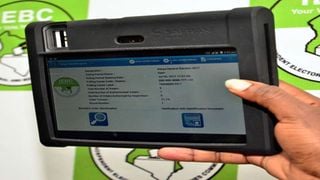
A gadget from OT-Morpho that was acquired by the Independent Electoral and Boundaries Commission (IEBC) for use in the the 2017 general elections.
| File | Francis Nderitu | Nation Media GroupPolitics
Premium
IEBC shops for new election management kit
The electoral commission is once again shopping for new ICT equipment to manage next year’s election, even as it began yesterday’s nationwide voter enrolment using biometric registration kits issued by controversial French firm OT Morpho.
Suppliers have up to 11am on Thursday to place bids for the supply, delivery, installation, testing, commissioning, support and maintenance of a new Kenya Integrated Elections Management System (Kiems).
The contract for the current system installed in 2012 and whose contract was single sourced at Sh6 billion to OT Morpho for the 2017 elections officially ended in January. Since then, there has been a controversy on whether to re-issue the contract to OT Morpho, which is now known as Idemia, or to issue a fresh tender.
Additionally, the server which hosts the Biometric Voter Registration (BVR) system that was acquired in 2012 has reached the end of its life. It has broken down a number of times due to disk failures from ageing hardware. Should it be used in next year’s elections it could provide a challenge.
A first attempt to replace Idemia through competitive bidding in May ran into headwinds after three months after the Independent Electoral and Boundaries Commission (IEBC) was ordered midway through the procurement process to start afresh at the beginning of last month.
The Public Procurement Administrative Review Board (PPARB) ruled that the electoral agency had not followed the law while shopping for the new system that will be used to register voters and candidates, identify them on voting day and transmit results.
Transmission of results on polling day was one of the contentious issues that caused the Supreme Court to nullify President Uhuru Kenyatta’s win in 2017. This is after the Kiems kits failed massively on voting day.
“Constitutional entities must as a matter of constitutional edict be deliberate in ensuring compliance in order to achieve the intentions of the law to wit, the promotion and development of local industry,” said the board in its ruling on September 7.
“This board plays an important role in ensuring procuring entities give effect to this aspiration and will not hesitate to cancel a tender that departs from it,” said the board.
Five companies -- Indra Solutions, Smartmatic International Holding BV, Genkey Solutions BV, Laxton Group Ltd and Africa Infrastructure Development Company -- had placed bids in the first tender that was opened for valuation on June 18.
On August 11, two months into the evaluation of the tenders, a Kenyan company Risk Africa Innovatis Ltd, which had not participated in the tender filed a case at the PPARB, seeking to stop IEBC from signing a contract with any of the bidders.
In its arguments, Risk Africa accused IEBC of structuring the tender in such a way that local contractors do not stand a chance. Additionally, the company said that IEBC had broken several procurement laws, which risked making the whole process an illegality.
“In violation of Section 155 (9) of the Public Procurement and Asset Disposal Act, the tender document does not require foreign entities participating in the tender to source at least 40 per cent of their supplies from citizen contractors prior to submitting the tender,” said Risk Africa.
“The applicant and several other citizens and or local contractors risk losing their competitive advantage guaranteed in law in the evaluation and award of bids in respect of this tender in breach of their legitimate expectations,” said the company.
IEBC requires 55,000 tablets for next year’s elections, which are now just 10 months away, to serve about 53,000 polling stations, with some for back-up when needed. The commission’s current server, which hosts the BVR has also reached its capacity.
“The BVR Automatic Fingerprint Identification Software (AFIS) acquired in 2012 was provisioned with capacity to hold a maximum of 20 million voters and has since reached its maximum capacity,” says the commission in fresh tender documents.
“The current register of voters contains approximately 19.7 million voters and the AFIS system may not cope with additional voter registrations until the capacity is expanded,” says the commission.
Given the lengthy period required for all the bids submitted in the fresh tender to be evaluated, it might take up to three months before the commission signs a contract with a new company. That will leave the commission and the new company just seven months to get the technology required to run next year’s polls in order.





